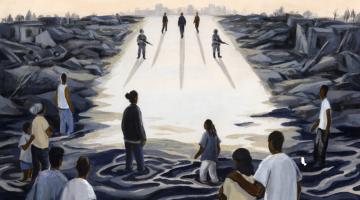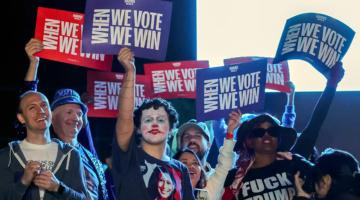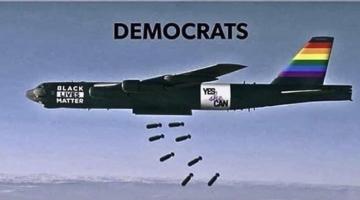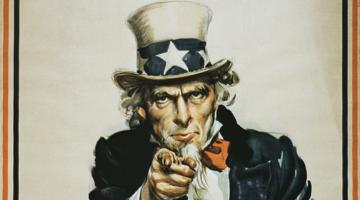White supremacist killers in the U.S. are simply implementing on a local level what their government does across the globe.
“White people attack Brown and Black Muslims in the United States precisely because of the country’s wars abroad.”
After two mass shooters killed and injured dozens of people in Texas and Ohio, Rep. Steve Cohen tweeted, “You want to shoot an assault weapon? Go to Afghanistan or Iraq. Enlist!”
Cohen, a Democrat from Tennessee, apparently did not take issue with the El Paso shooter’s desire to slaughter people of color — he merely wanted to redirect his bullets toward people of color outside of the United States. His tweet was a chilling reminder of how the United States’ militarism against other countries and its domestic manifestations of white supremacy replicate and reinforce each other.
White people attack Brown and Black Muslims in the United States precisely because of the country’s wars abroad. The United States’ destructive trade agreements and military intervention in Central and South America drive North American refugee border crossings, and armed white militia groups patrol the desert to catch or kill refugees seeking help. Many local police departments are trained in “community policing,” which police scholar Kristian Williams explains, is stylized after military patrols with locals during war. In Ferguson, Missouri, white militiamen (mostly former military and police officers called “the Oathkeepers”) openly carried assault rifles alongside the police to assist in monitoring the protestors during rallies in 2014. They were not turned away, arrested, or discouraged from escalating violence.
“‘Community policing” is stylized after military patrols with locals during war.” inthe loop
These acts of violence and recent senseless mass shootings start making sense when evidence emerges showing that the actors have been inspired by a president who has called countries in Africa “shit-holes” and recently told four progressive congresswomen of color to go back to the countries that they “came from” (despite the fact that three of them were born in this country and they are all U.S. citizens). Ironically enough, the United States and European countries have exploited, colonized and pillaged African and Asian peoples for centuries, suppressed their resistance movements, and denied them entry into countries whose wealth comes from the cycle of violence against them.
Actually, the United States government, which Dr. Martin Luther King Jr. called “the greatest purveyor of violence in the world,” commits the most routine violence against people of color on Earth, and has 800 military bases in 70 countries. So when white supremacists attack people of color within the U.S., they are simply implementing on a local level the bloody work that their own government carries out day in and day out across the globe.
In truth, if anyone wanted to get paid to play around with military equipment, they do not have to leave the country, or even be a white supremacist. They could just join one of the 18,000 local law enforcement agencies in the United States. The military’s leftover, gently used equipment is cycled and recycled through police departments, used in S.W.A.T raids against people of color, and to violate the rights of protesters. In fact, U.S. soldiers cannot legally use tear gas in war, but police officers are granted free rein to use it against protesters.
“The military’s leftover equipment is cycled and recycled through police departments.”
The militarization of racist policing within the U.S., the use of military force against people of color throughout the world, and white nationalists’ vigilante attacks against people of color on U.S. soil are different chapters of the same manifesto.
Given that reality, why would a congressman like Cohen, who brags about being anti-Trump, make a call for would-be vigilantes to merely shift their violence to another place, rather than to stop it?
Musician, poet and author Gil Scott-Heron said it best: “If we only work for peace, if everyone believed in peace the way they say they do, we’d have peace. The only thing wrong with peace, is that you can’t make no money from it.”
Mass shootings and the wars abroad are both profitable to companies in the military- and prison-industrial complexes. For example, powerful companies and lobbyists cannot make money from removing guns from the streets or from the police, but they can make money from selling cameras to cities to surveil their streets and to put on officers’ bodies and dashboards. It is no accident that Republicans argue that the only thing to stop a “bad guy with a gun” is a “good guy with a gun”; violence sells. Saving human lives interferes too much with capitalism.
“The only thing wrong with peace, is that you can’t make no money from it.”
These shooters have been indoctrinated with white supremacist ideologies found not only in each other’s manifestos, but also in the United States constitution, in writings from the Supreme Court, on news channels, in movies and on social media. Some of them believe theyare under attack and that there is an invasion of nonwhite people threatening the supremacy of white people. To them, any form of resistance to white supremacy also feels like an attack on white people and society, and they are on high alert against the mainstreaming of civil rights, Black power, LGBTQ rights and women’s rights movements.
But activists and organizers must continue to combat the violent tools and violent logics of white supremacists and the intertwined military- and prison-industrial complexes. Social movements, education and progressive policy change can point us in the right direction; policing, militarism and the industries that profit from or perpetuate violence cannot. Since white supremacy, militarism and capitalism are in solidarity, so must be the movements against all three.
Doing so means divesting from the institutions, people and mindsets that perpetuate white supremacy, xenophobia and violence. Washington, D.C.’s, chapter of Jewish Voice for Peace, for example, has a campaign to stop the program that trains U.S. police officers alongside Israel Defense Forces who occupy and oppress Palestinians. In North Carolina, Working to Extend Anti-Racism Education (“we are”) is an organization that runs anti-racism summer camps for kids, which works with families and schools to dismantle systemic racism. We need both types of intervention. We need robust educational, economic and environmental investments in human beings, communities and countries, and crucial divestment from the institutions, people and practices that perpetuate white supremacy, xenophobia and violence.
“We need divestment from institutions that perpetuate white supremacy.”
Similarly, we must also push to ensure that national conversations around immigration, policing, women’s rights and climate change are influenced less by our white nationalist president than by all the people who are demanding bodily autonomy for women, environmental justice, open borders, abolition of Immigration and Customs Enforcement and prisons, democratic socialism, the mattering and value of Black life, free health care and reparations.
This is no small feat, but it is possible, and the pursuit is worthy. Gil Scott–Heron reminds us that the preservation of human life requires a struggle for peace: “Peace is not the absence of war. It is the absence of the rules of war and the threats of war and the preparation for war. Peace is not the absence of war. It is a time when we will all bring ourselves closer to each other, closer to building a structure that is unique within ourselves because we have finally come to peace within ourselves.
Derecka Purnell is a movement lawyer, writer and activist.
This article previously appeared in Truthout.
COMMENTS?
Please join the conversation on Black Agenda Report's Facebook page at http://facebook.com/blackagendareport
Or, you can comment by emailing us at comments@blackagendareport.com



















